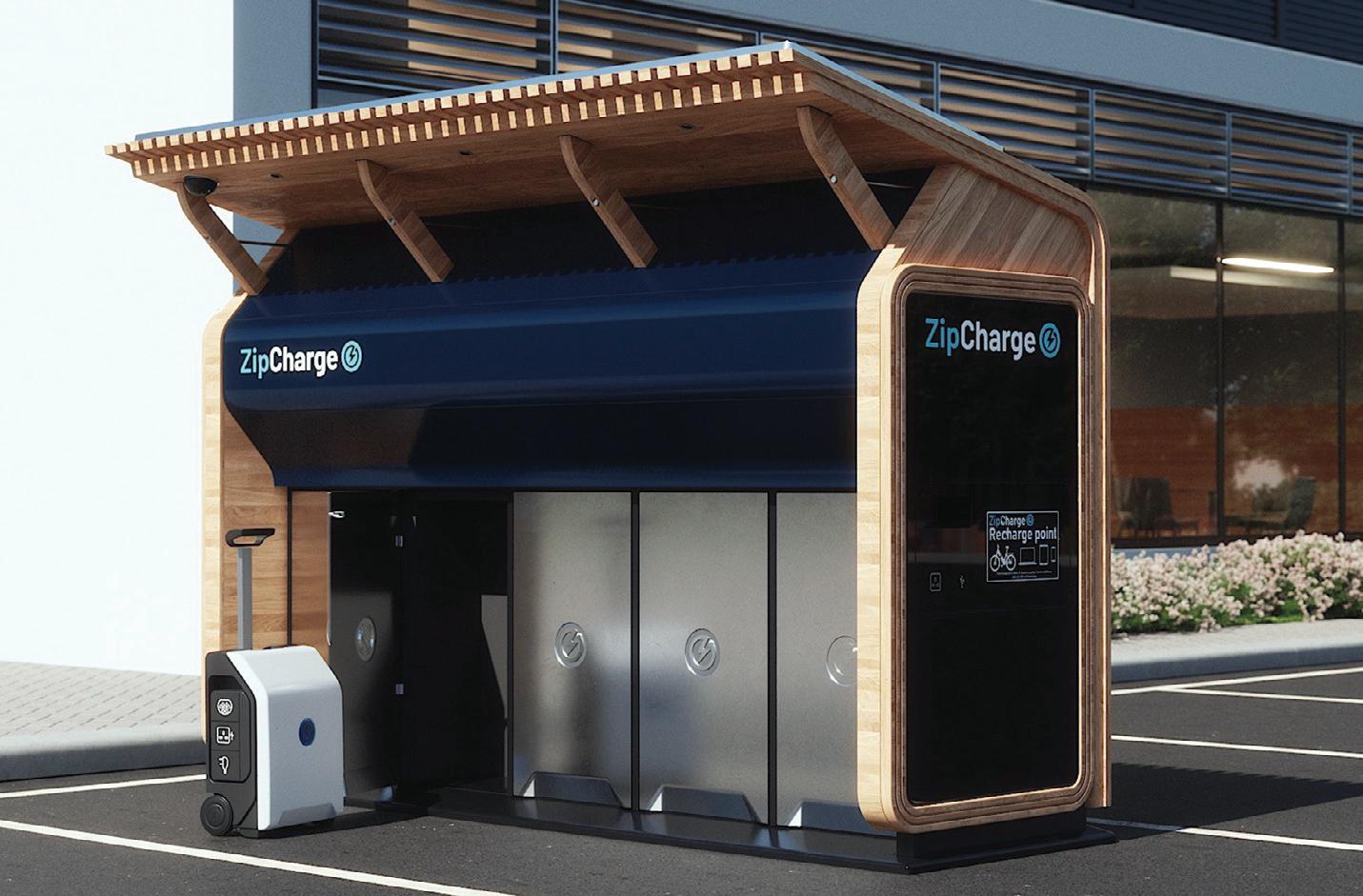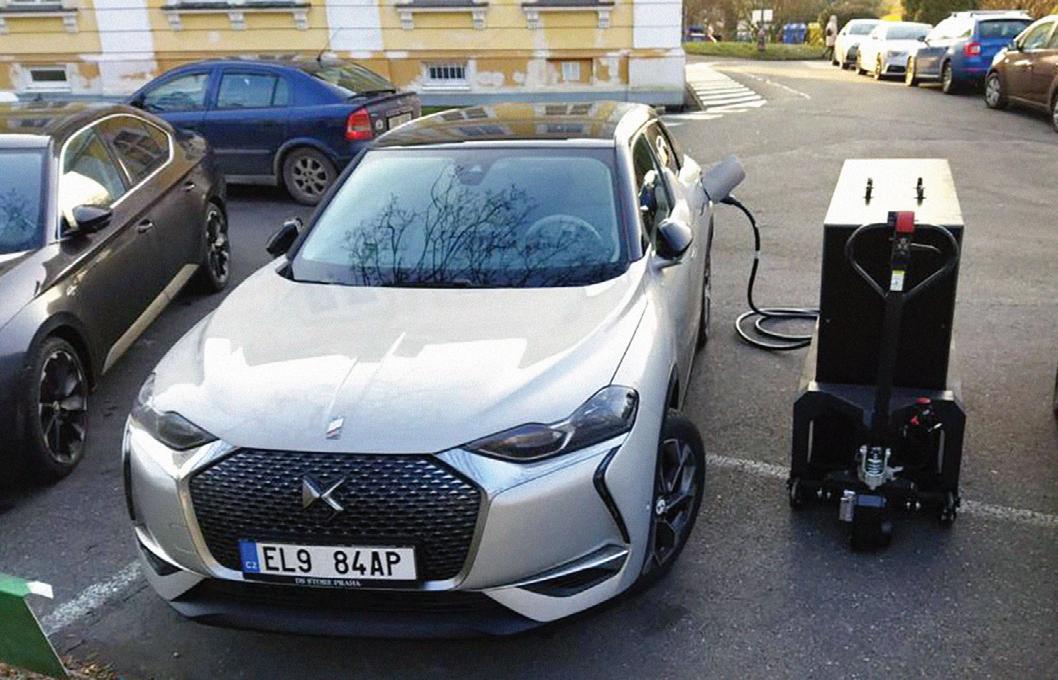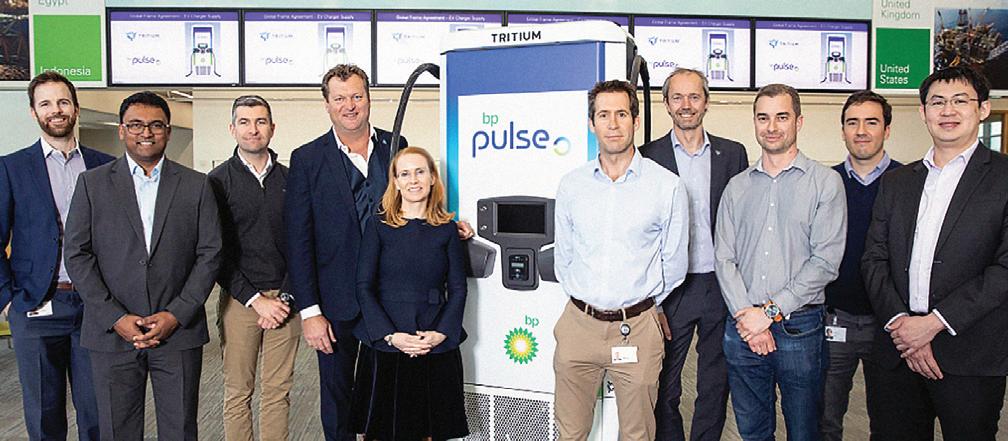
8 minute read
Healthy developments
ZipCharge unveils the GoHub
Hubs will provide shared access to Go portable EV charging powerbanks
Advertisement
ZipCharge used Earth Day to reveal the GoHub, an infrastructure that makes the company’s portable electric vehicle chargers available for shared public use. The GoHub is designed to provide a community-based solution that can be installed at a much lower cost and at a much faster rate than fixed chargers, enabling any parking space to be a charging spot.
ZipCharge said the ability to roll-out EV charging infrastructure at speed is essential to allow national and local governments to deploy it at a faster rate where it is needed the most to support mass EV adoption.
EV owners now have the choice to purchase the Go outright, on subscription or rent one through the GoHub.
Each GoHub will hold multiple ZipCharge Go EV powerbanks to address the need for convenient, flexible and lowcost energy. The GoHub station is modular and flexible in size, making it suitable for a diverse range of locations, including on-street, in car parks, at work and in private environments.
Speaking on 22 April, ZipCharge cofounder Jonathan Carrier said: “We intend to establish the world’s first vertically integrated ‘energy point operator’ (EPO) to serve hundreds of millions of people around the world so everyone can access convenient and low-cost energy. The ZipCharge Go and the GoHub enable the storage of clean energy, which can then be distributed for a multitude of uses from charging an EV to powering equipment.
“We predict our portable powerbanks will outsell fixed home chargers by 2030, in the same way mobile phones overtook landlines. That’s because the Go can be used for more than EV charging, it’s a portable energy storage device for personal energy management. We have the bold ambition to deploy 100,000 GoHubs globally by 2030 to support EV charging, local grid resiliency and energy democracy.”
ZipCharge co-founder Richie Sibal added: “The Go and the GoHub are integral components of our future energy platform, one that combines hardware, software and distributed energy storage in the home and our public energy points to provide a wide range of energy services for our customers. We will use technology to solve the inequality that exists around access to charging and energy by placing a ZipCharge Go unit within five minutes walk of where people live and park.”
In its base form, the GoHub comes in two variants: a single sided unit houses five ZipCharge Go portable powerbanks; or a double-sided GoHub with ten. Both are designed to fit comfortably into a regular parking space. The hub can also be sited on the pavement or close to where power already exists. The company said GoHubs can be intelligently reconfigured, expanded and connected together, growing in tandem with the adoption of electric vehicles.
Through the GoHub, ZipCharge Go powerbanks will be available to rent 24 hours a day with the option to pre-reserve a Go in the app. As the user approaches the correct bay door of the GoHub automatically opens. They then pull out the charger from its dock inside the GoHub, wheel it to the vehicle and plug-it in. Once finished, the user is notified on their smart phone, they collect the Go and return it to the bay allocated via the app.
Anytime access will allow anyone to use a Go powerbank for a simple to understand fee: £1, €1 or $1 for a 4kWh charge with no connection fee. ZipCharge thinks this simple pricing arrangement allows everyone to know what their daily driving will cost.
ZipCharge aims to provide lower prices per kWh compared to fixed AC charging given the integrated energy storage system in the GoHub allows ZipCharge to take cleaner, cheaper electricity overnight.
The GoHub integrates a range of optional technologies including: rainwater harvesting; Wi-Fi hotspot; mobile device charging; a green living roof and renewable energy generation, including innovative wind turbines suitable for both urban and rural environments developed by Flower Turbines in the Netherlands.
The GoHub can also provide sustainable charging solutions for other forms of mobility with an optional micromobility docking station for e-scooters and e-bikes that integrates with any provider.
The GoHubs re-use end-of-life batteries from the ZipCharge Go as the integrated energy storage system (ESS), creating a circular approach to extending battery life and usability, while also lowering cost. The integrated ESS in the GoHubs is designed to provide resiliency to the local grid by charging the Go chargers at times of peak grid demand, feeding the portable chargers at times of peak energy demand, reducing grid dependence and building resiliency.
ZipCharge claims its GoHubs will cost a third the price of fixed on street level 2 chargers to install, transforming the payback period for AC public charging from 8-10 years to less than two. The company said this would allow the government and public funding support to install more chargers in more locations.
GoHubs could also be placed where the grid can best cope with the extra load, as well as being far less disruptive to the streetscape.
GoHubs will come with a suite of technology support. They will all be networked to the ZipCharge cloud and back-office with energy management and remote monitoring software to ensure operational safety and optimise charging costs and energy use.
The GoHub
Urban Mobile Charging pilot launched
Trials planned for Czech Republic, Netherlands and Germany
As electric vehicle ownership rises across Europe, the availability of sufficient charging infrastructure is a growing concern both for cities and drivers alike.
Networks of fast chargers are seen as a solution, but in contrast to slow charging stations, fast-charging stations significantly load local electricity networks so cannot be installed everywhere. For example, it is difficult to install fast chargers in urban areas such as historic city centres, car parks or apartment blocks where the electricity network capacity extensions could be very costly.
One solution to improve the availability of fast charging is to bring a fast-charging station to an electric vehicle. Interest in this idea has led to the development of the UMC (Urban Mobile Charging) programme, which is

The NimBee mobile charger
supported by EIT Urban Mobility, an initiative of the European Institute of Innovation & Technology (EIT), which is a body of the European Union. The UMC will see mobile charging systems and techniques trialled in three cities – Zilina in the Czech Republic, Helmond in The Netherlands and Braunschweig in Germany.
UMC aims to create a service for fast, mobile, renewable, on-demand EV charging in the three trial EU cities to ensure drivers have access to charging when needed and suitable without excessive use of cities space and infrastructure. This will be done via a ‘charging-as-aservice’ approach that is easier for drivers.
The service will be based on the NimBee solution developed by Nimble Energy which brings the battery-backed charger to where the car is parked while at the same time providing demand-side flexibility for the grid. The aim is to develop an autonomous charging robot in 2023. A pilot operation has been launched in Prague, Czech Republic.
Jan Šamal, chief executive of Nimble and creator of the NimBee idea, said: “I want to rid the owners of electric cars of their dependence on charging stations. Why should you drive to a charger when a charger can come to you? NimBee is electromobility minus the hassle.” UMC demonstration 1: The first public demonstration of UMC will take place in the Czech city of Zilina next month. A mobile crew will respond to app requests for the mobile battery DC NimBee charger, which will be transported on a car trailer to the EV driver’s location. UMC demonstration 2: The second demo is planned to take place in the Dutch city of Helmond in early 2023. This will be focussed on testing an UMC charging unit as a static self-service to charge EV. UMC demonstration 3: The third demo will be take place in Braunschweig, Germany, in late 2023 with the aim of providing a fully autonomous charging unit in a car park.
Ohme becomes EV charger provider for Motability scheme
Ohme has become the official EV charger provider for customers on the Motability Scheme. The partnership with Motability Operations will help make the switch to electric easier for disabled people through reliable, personal e-mobility.
Motability provides mobility to more than 640,000 customers who exchange their higher rate mobility allowance to lease a new vehicle. Motability Operations delivers the scheme under contract to Motability. It is the largest fleet operator in the UK.
“Our customers have over 600,000 cars on the road in the UK,” said Andrew Miller, chief executive of Motability Operations. “To make the transition to electric as easy as possible for our customers we have to find practical and affordable ways for them to charge their vehicles and help to reduce anxiety over range.”
Ohme said its Home Pro smart charger will enable Motability Scheme customers to save money when charging by enabling them to pre-set their charging periods when prices are lower and also when renewable energy generation is at its highest.
Ohme chief executive David Watson said: “Our Home Pro is the best EV smart charger on the market and can help to reduce charging costs and CO2 by up to 70% compared to standard charging, so we are looking forward to helping Motability customers realise those savings.”

BP orders Tritium fast chargers
Tritium, a manufacturer of direct current (DC) fast chargers for electric vehicles has entered into a multi-year contract with BP.
Tritium will supply EV chargers and related services to support BP’s global EV charging network.
BP has placed an initial order of just under 1,000 chargers for the UK, Australian and New Zealand markets.
Richard Bartlett, senior vice president at bp pulse, said: “This new global agreement with Tritium, it will help bp pulse deliver its mission to provide fast, reliable charging for EV drivers and to accelerate the roll-out of the charging infrastructure needed as the world transitions to decarbonise road transport.”
Tritium’s chief executive Jane Hunter said: “The electrification of transportation is entering an incredible era when major companies like bp are providing critical support to transition the world to cleaner more reliable transportation.
“We’re thrilled to be working with BP to create greater global access to fast charging in support of their mission to become a net zero company by 2050 and to be a leader in helping the world get to net zero emissions.”





